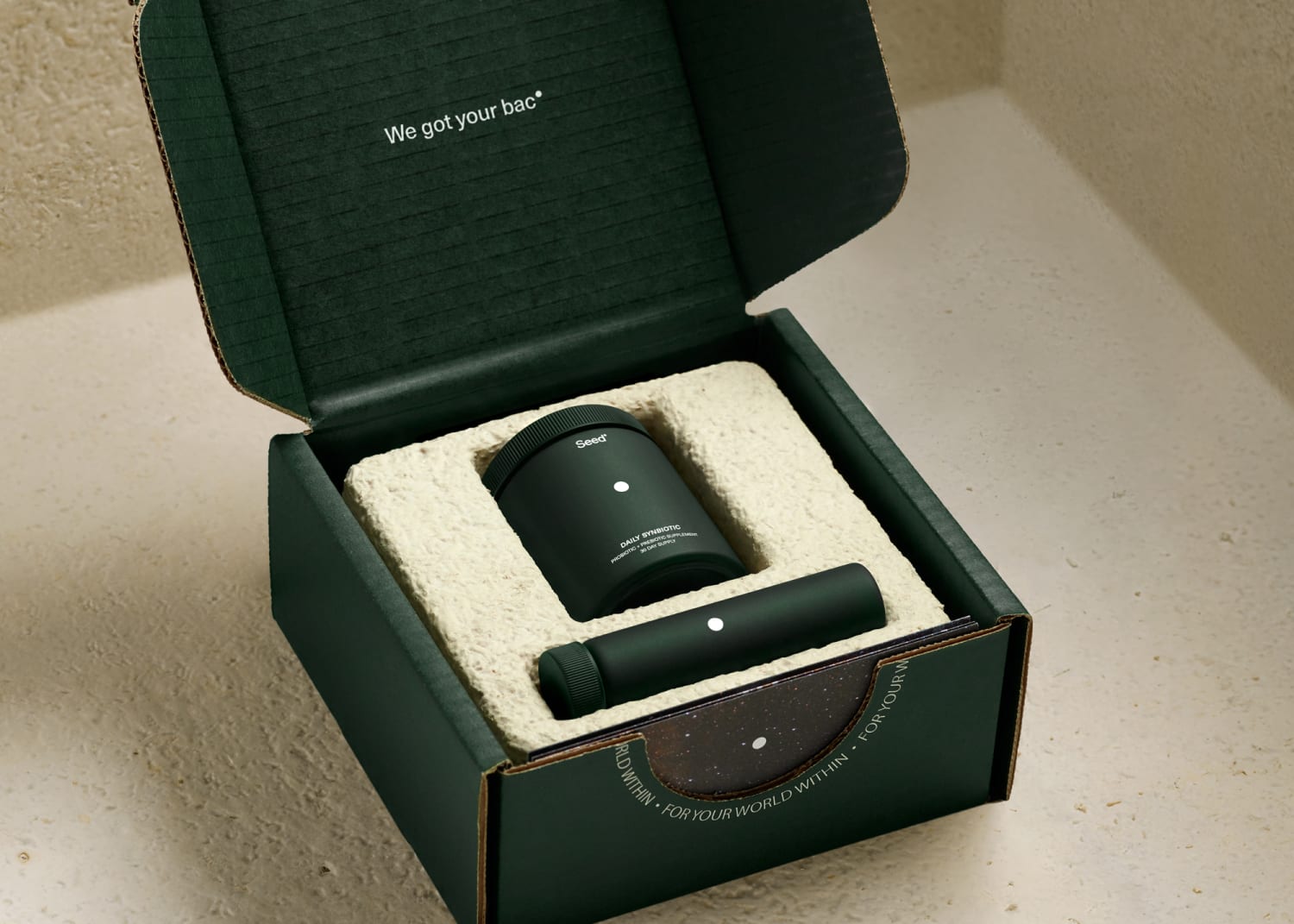In the year that the UK and Ireland declared a climate change emergency, pioneering companies are responding to this sense of environmental urgency by finding inventive, sustainable ways of packaging their wares. Instead of using materials that damage the planet, they’re experimenting with biodegradable alternatives that contribute positively.
No more excuses—brands champion solutions that actively benefit the environment.

In August, British wellness brand Haeckels, based on England’s windswept Kent coast, debuted its “biocontributing” packaging. Designed for Haeckels’ scented candles and haircare and skincare sets, the box is crafted from mycelium, a material that forms the root system of mushrooms, combined with sawdust, flax, and hemp husks. This concoction is grown around a mold, with the mycelium acting like glue. The resulting dried material is lightweight and resists impact and heat. An outer wrapper is made of seed paper—recycled paper pulp mixed with wild-flower seeds.
“We’re in a lot of high-end department stores and I was quite keen to see a natural, fibrous material on some of those extravagant department store shelves,” Haeckels founder Dom Bridges tells JWT Intelligence.
After use, the mycelium box and the seed paper can be buried together, with the mycelium encouraging the seeds’ growth, making the packaging “effectively a seed bomb,” according to Bridges. “Put the two together, one is helping the other. The mycelium is biodegrading in as little as six weeks into the soil, enriching that soil, and then embedded in the seed paper are wildflower seeds from indigenous UK wildflowers and vegetables.” These, he explains, help support the bee population.
Bridges points out that as consumers increasingly demand transparency from brands, “there’s no hiding” and no “sticking your head in the sand” when it comes to sustainability. Once a customer’s “hard-earned money” has been taken, he says, “it’s completely unacceptable to think that someone would buy something and then be responsible for taking that to the trash to get it recycled, or breaking that packaging down into four different types of plastic. It’s just ridiculous. That’s not the customer’s responsibility.”

Lush cosmetics has long been an advocate for the environment. Around half of its products are sold “naked”—without packaging—and in August 2019 the company achieved certification from the UK’s Carbon Trust that the cork pots in which its shampoo bars can be stored are a carbon-neutral packaging product. This certification verifies that “each 35g Cork Pot sequesters over 33 times its weight in carbon dioxide, removing approximately 1.2kg CO2e from the atmosphere.” Lush notes that carbon sequestered is achieved through the growth of the cork oak trees, reporting that 20,000 native trees have been planted in southern Portugal, where Lush’s cork is sourced, in the first year of its cork pot production. Cork is a “non-timber forest product,” Lush says, as it’s harvested from the trees’ bark, which then grows back over nine years and can then be harvested again. “Lush cork pots are a truly regenerative piece of reusable packaging which is biodegradable at end of life, giving our customers worry-free packaging that nature can recycle. This is the future for all packaging,” says Nick Gumery, Lush creative buyer. “There are many challenges ahead but it is up to the industry to find natural material solutions for all our packaging needs.”


US company Seed promotes the application of microbiome science, and offers synbiotics (a combination of probiotics and prebiotics) to support digestive and overall health. The company has worked with US biodegradable packaging solutions company Ecovative Design to produce the mycelium trays in which Seed’s recyclable glass jars are presented—these decompose naturally in soil within 30 days. The corn-foam padding that protects its refill products in transit is made from non-GMO cornstarch by another US firm, Green Cell Foam. Compostable and biodegradable, it can also simply be dissolved in water and is entirely non-toxic.
As consumers become more aware of the impact of packaging on the environment, these sustainable solutions allow shoppers to feel good, rather than guilty, about the environmental effects of their purchases.
Please provide your contact information to continue.
Related Content

Bitter Truths from VML UK Targets Parents and Showcase Duracell's Bitter Coating Technology

